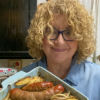Easter in Poland is huge, a two day holiday. Everything is closed, families travel to make sure they're all together. I wrote about Polish traditions when I arrived in 2011. I've asked my friend, Yana, to write about celebrating Passover and raising a Jewish family in Poland. Yana usually blogs in Hebrew for her friends and family at home in Israel. After reading a google translation (which misses a lot) I knew that I wanted you to hear her story too, of how it took moving to Poland to make her "a real Jewish mother." Here's Yana --
So Easter…Hmm…what can I say about Easter?….there is not much that I know about the Christian holiday, something to do with Christ’s last supper? eggs and bunnies…family and lots of food. It’s almost the same for the Jewish Passover (Pesach in Hebrew), with a few minor differences: The family is gathering around the table but instead of eating they read the long and unending, traditional “Hagada”, only after that you’ll receive the real meal. …actually as I remember from my childhood, while our parents were reading the Hagada we were just joking around and joining them only for the singing and the presents parts. The “Hagada” is the traditional book which is read on the Pesach night. It tells the story of the people of Israel escaping from the slavery in Egypt. While its read, the dining table is usually empty and there are only 6 elements on it in a special decorated bowl:
- There are two types of Bitter herbs, symbolizing the bitterness of the slavery.
- A sweet, brown paste of fruits and nuts, representing the mortar used by the Jewish slaves to build the storehouses of Egypt.
- Celery or cooked potato, which is dipped into salt water
- A roasted chicken bone, symbolizing the Pesach sacrifice in the Temple in Jerusalem
- A hard-boiled egg, symbolizing the festival sacrifice that was offered in the Temple in Jerusalem.(Yea, we have eggs too!)
- With the bowl there are 3 slices of Matza, and enough red wine or grape juice to fill 4 glasses to each guest!
So as you can imagine for us the kids it wasn’t much fun – long reading and eating some celery and then singing some songs and reading some more. It lasted more than an hour and only after all the reading was done, the real food was served and lots of it! At least just like on the Christian New Year’s Eve we went to sleep really late. Pesach is often called the holiday of freedom because the people of Israel escaped from slavery and the guests by the tradition have to sit in comfortable chars to enjoy and remember their freedom.
The truth is that all this ceremony is made especially for the younger generation, so they will know the history, the traditions and will know how to tell it to their kids. From my own experience, it worked, I wrote most of it without using the Wikipedia. The Hagada is usually read by all the participants at the table, one after another, there are questions that the children suppose to answer, lots of songs and a game played in which the kids need to find a hidden piece of Maztah and receive presents for finding it.
Another element, which by the way, I recently discovered existing in the Christian tradition as well, is leaving an empty place, with a special glass of wine, at the table, for Elijah the prophet. Usually at some point of the reading, the kids need to open the door for him and invite him in. This is the trick to keep the children from falling asleep while the long reading, they might miss the prophet visit. When my son who just turned 5, saw it last week, on YouTube, in some Israeli children show, he asked if it’s Saint Mikolaj (Polish St. Nicholas) and is he going to bring presents now also…
Yes, as you guessed, one of the challenging things for us, in living in Poznan is to get our kids to feel part of all of this. While living in Israel the kids learned all the traditions in the kindergartens. On holidays we were always at our parents or friends, so it was all around us and we didn’t had to make any effort. We are not religious, but it is very important for us, that our children will know the traditions and the history of their ancestors. Luckily for us there is YouTube where I always find some Israeli children shows for the holidays, internet sites with games that can be printed or made at home and every holiday we are cooking traditional food (that of course I wouldn’t be doing in a million years, in Israel, because it can be bought in any store). I can actually, admit saying, that I become much more traditional while living in Poland than I would ever be in Israel. Yes, Poznan made much more Jewish mom out of me, than Israel or any other place with a large Jewish community would.
By the Jewish tradition for 7 days, during Pesach, we are not allowed to eat any bread or any food that contains grain combined with water and left to stand row for longer than 18 minutes. No pizza or beer for us. All the kitchen dishes are replaced with a special dishes that used only in Pesach, or get a special treatment to make them kosher for Pesach. Few days before Pesach all the grain (the same one that is known today as causing problems to people with celiac disease) is sold, thrown away or burn by all religious Jews all over the world. The houses, cars and offices getting a special treatment. In Israel, its custom for the religious workers to ask for a few days off, before the holidays for cleaning.
The State of Israel, every year “sells” all its grain to a Christian businessman that lives near Jerusalem and after the holidays buys it back from him. This act is signed every year by the Minister of Finance. The only thing that allowed to enter your property is Matzah, which is mixed flour and water cooked right away in high heat. It is a reminder of the Egypt exodus in which the Israelis left Egypt in such a hurry; they couldn’t wait for their bread to rise. The symbolic meaning behind it, as in any Jewish tradition, is much deeper: don’t take your bread for granted and much more than that, don’t take any good thing in your life for granted – appreciate what you have and cherish it! The tradition of cleaning all your property and belongings top to bottom and throwing the gluten products is very old and some say, probably is the origin of the spring cleaning tradition that is known today, all around the world.
So Happy Spring Cleaning everybody!!! and Happy Holidays!!!
Yana
PS (from Lois)– Unless you’ve brushed up on your Hebrew, you’ll need google translate to read this post, but it’s worth it. In it, Yana talks about celebrating holidays with the children and trying to manage a household with four languages!
Here’s a post from Yana’s blog (in English) about Christmas with some surprising revelations!
An accountant by trade and a food blogger since 2009, Lois Britton fell in love with Polish cuisine during the years she lived in Poznań, Poland. As the creator of PolishHousewife.com, she loves connecting readers with traditional Polish recipes. Lois has a graduate certificate in Food Writing and Photography from the University of South Florida. She is the author of The Polish Housewife Cookbook, available on Amazon and on her website.




Kelley @ Never a Dull Day in Poland
Seriously, no bread for 7 days??? Now that is willpower!
Jean
Thank you so much for sharing the traditions of Passover. I had no idea of the history behind the holiday and found it very interesting.
polishhousewife
My church did a good job of educating me about Passover; they’ve even held Passover Seders, which were very popular and the seats were booked very quickly. Besides Yana becoming a Jewish mother, I found the selling of the wheat and buying it back very interesting (it appeals to the accountant in me) and the fact that this holiday and others are meant to remind us not to take things for granted – powerful stuff, that!
Joy @MyTravelingJoys
Very interesting traditions! Thanks for sharing! Are you still celebrating most of these here in Poland too?
Yana
Hi, Thank you for asking.
As I wrote we are not religious but we do want our kids to know the traditions. So last year we had a few Israeli friends for dinner, read some parts of the Haggadah from the iPad (couse we didn’t have the book) and sang a few songs. Yesterday we also had dinner with friends, but they had classes in the early morning, so we just skipped the reading part to the eating and drinking wine part 😉 And the kids looked for the missing piece of matza and received presents. It’s much easier in Israel because of the days off on the jewish holidays. In the 7 days of Pesach most restaurants and supermarkets won’t sell food that contains wheat but usually there are substitutes for any food you wish for, without wheat. If you have any more questions feel free to ask 🙂
lola
Ester is a great moment to visit Poland, because of the interesting tradicions. At this time we can go for example to Szczecin, to spent there time in Dana Hotel, which is unusual 100 years old building. We can have there a rest in comfortable rooms, taste local cusine and explore this fascinating city:)